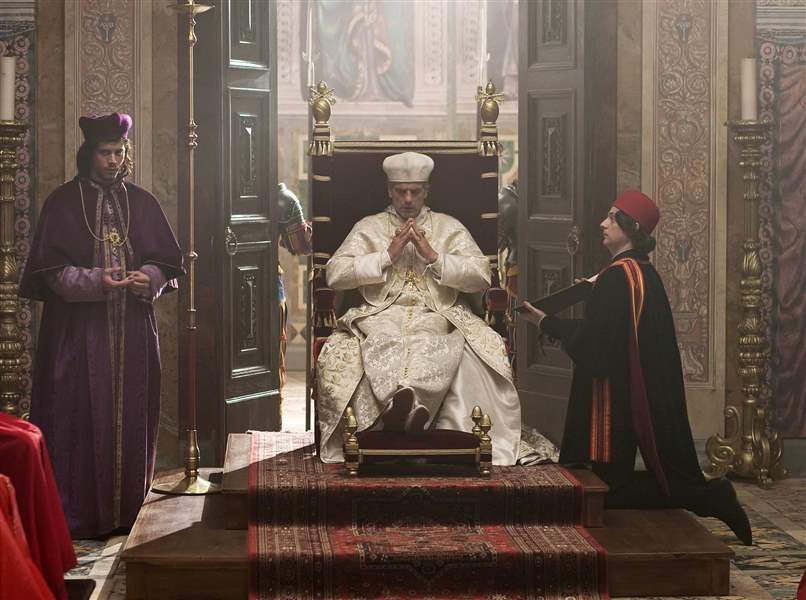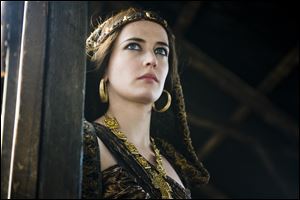
Premium channels throw down the gauntlet -- literally
4/6/2011
Jeremy Irons portrays Rodrigo Borgia, Pope Alexander VI, and Francois Arnaud portrays his son Cesare Borgia, left, in the Showtime original series, 'The Borgias.'
ASSOCIATED PRESS

Jeremy Irons portrays Rodrigo Borgia, Pope Alexander VI, and Francois Arnaud portrays his son Cesare Borgia, left, in the Showtime original series, 'The Borgias.'
Anyone pitching a concept these days to pay-cable channels should heed this advice: Think big. Really big.
Almost every new production debuting this spring on HBO, Starz, and Showtime boasts a budget that would make Donald Trump cringe. According to The Wall Street Journal, Starz's Camelot -- which adds kink and cruelty to the King Arthur legacy -- costs $7 million an episode, roughly double the price to churn out a network drama. HBO's Game of Thrones, based on the popular fantasy novels, has the out-of-this-world price tag of $45 million for 10 episodes. That's the same budget as for Showtime's The Borgias, a look at the 15th-century family that was seedier than the Sopranos.
"Quiet dramas? We're going to leave that to other people," said Starz President Chris Albrecht, who brought Band of Brothers and Rome to HBO when he ran its shop. Albrecht seems determined to make Starz the most lavish channel on the cable box, pouring money into projects such as Pillars of Earth and Spartacus, period pieces with lots of blood, battles, breasts, and biceps. "We're looking for premium-television-flavored popcorn," he said.
Living large can work.
ON TV
- 'CAMELOT' 10 p.m. Fridays Starz
- 'THE BORGIAS' 10 p.m. Sundays Showtime
- 'GAME OF THRONES' 9 p.m. April 17 (premiere) HBO
The Pacific and Band of Brothers, the two most expensive miniseries ever, paid off handsomely for HBO in subscription increases and DVD sales. Spartacus, the biggest hit in Starz's 18-year history, has spawned a prequel and a second season, despite the fact that they had to replace leading man Andy Whitfield after he learned that he had cancer. Boardwalk Empire, which spent $5 million just creating its 1920s set, is not only HBO's biggest smash since The Sopranos, but it took home the Golden Globe for Best Drama.
Big budgets don't guarantee success. HBO's Rome, the most expensive series at the time, crumbled after two seasons. Kings, an ambitious retelling of the David-and-Goliath tale, was one of the lowest-rated dramas of the 2008-09 season for NBC and was yanked after just 12 episodes.
Game of Thrones might be the biggest risk of the current season. Sure, it's based on red-hot books by George R.R. Martin, but with the exception of Robert Halmi, Sr.'s schlocky miniseries of yesteryear (Merlin, Gulliver's Travels), the genre rarely has spun magic beyond the realm of syndication.
Martin believes that's about to change -- and he has a solid model to support his argument.
"There's no way to prove this, but when Star Wars became a megahit, it really opened up the door for sci-fi on TV," he said. "When George Lucas made Willow, there was a lot of anticipation that he would do the same thing for fantasy, but Willow wasn't Star Wars."

Eva Green in the Starz series, 'Camelot.'
And it wasn't Lord of the Rings.
Martin said that before the success of that franchise, he tried to write for television, but his scripts were always sent back five or six times for being too long and too expensive. That's now changed.
Sean Bean, a cast member of both the Rings cycle and Thrones, said this TV production, which features 742 actors, is more detailed and incredible than any of the feature films.
"It's similar to Rings in its size, its quality, its magic, its danger," he said. "I happen to enjoy playing these kind of roles with riding horses and swinging swords and wearing wigs and growing beards, although I don't like it first thing in the morning when it takes you three hours to get ready."
Pay-cable executives are hoping audiences are hungry for those same thrills (without the early call time), especially in economically troubled times when people can barely afford an apartment, let alone a castle.
"I think in uncertain times you want to look into stories that are kind of knitted through centuries and examine what the human condition is and how we strive against conflict," Camelot co-creator Chris Chibnall said. "I think they offer a reassurance that people have lived through this before and that people have prevailed."
David Benioff, who co-wrote the Thrones production, got some reassurance that there's an appetite for this kind of storytelling beyond ComicCon regulars when he was telling a stranger (at a wedding) about the show. A few days later, he got a two-page e-mail from his new friend, who went on and on about how excited he was about the project. The fan: the dean of Stanford Law School.
Why would such a respectable egghead be giddy about a grown-up version of Dungeons & Dragons? Because bigger can be better -- as long as the creative team doesn't get so wound up in special effects and sword duels that they forget about character.
Rome was one of the more critically acclaimed series of the past 10 years, not because of the colossal Italian set, but because of the human appeal of the little man facing incredible odds. Spartacus, at least in my mind, is an inferior adventure, so swept up in slow-motion gladiator battles and soft-core porn that we can't remember why anyone would be willing to go to the cross to protect the title character.
But what do I know?
Rome was a bust and Spartacus is a hit. Maybe the allure of such productions is more primeval.
"Sure, these are timeless stories of the downtrodden and justice," said Steven S. DeKnight, executive producer for Spartacus. ''But also, who doesn't like a lot of backstabbing and intrigue and a good swordfight now and then?"